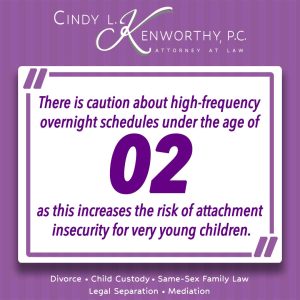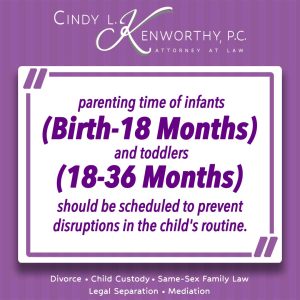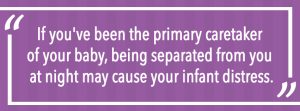As you begin to discuss matters of your divorce with your spouse, you may be anxious when it comes to the conversation about overnight visitation for infants you both share.
Your biggest priority is the health and safety of your child. Infants and children are the happiest when they form strong, meaningful attachments to at least one primary caregiver. There are also benefits when a very young child forms an attachment to both parents.
Is a child’s attachment to the other parent damaged if they cannot spend the night? How do you create a visitation schedule for an infant or child? You can find answers here.
The process of divorce is hard on co parents, but the state will work with you to make decisions in your child’s best interest.
Past Legal Approaches to Child Custody
At the start of the 20th Century, the courts began to focus on the kid’s rights over the rights of a particular parent.
 Courts believed that babies should spend every night with the primary caregiver and only spend time with the other parent during daytime hours. The courts also assumed the primary caregiver would always be the mother and receive child custody.
Courts believed that babies should spend every night with the primary caregiver and only spend time with the other parent during daytime hours. The courts also assumed the primary caregiver would always be the mother and receive child custody.
Therefore, fathers did not get overnight visits with young children.
What About Custody Cases Today?
In many cases today, fathers and mothers both interact with their children.
“Primary caregiver” is typically understood to be the person who does the following for the children the majority of the time:
- Feeding
- Bathing
- Hygiene routines
- Medical appointments
- Clothing
- Cuddling
- Soothing
Depending on the age of the child, there will be different tasks associated with this role.
Can There Be More Than One Primary Caretaker?
One parent could perform these tasks more frequently than the other, or they could be split evenly between the two parents.
There is research that states that separating a child, including a young baby, from the person who takes care of these needs can cause stress, depression, anxiety, and other negative impacts.
If a mother was the primary caregiver, being removed from her may lead to distress related to abandonment and loss. The same would be true if it was the father.
A question arises about what to do when both parents have had an equal division of parenting responsibilities because it is widely accepted that it’s in the child’s best interest to develop a strong relationship with both caregivers.
Separation for overnight visits is harmful to a child’s development and sense of security. Both parents have a right to build a relationship with their child if they are both responsible adults who can provide a safe environment.
Unique Considerations During Infancy
 According to the Encyclopedia of Early Childhood Development, there is a lack of clear research on the impact of overnight visitation for infants. However, a few conclusions can be drawn from the research which exists:
According to the Encyclopedia of Early Childhood Development, there is a lack of clear research on the impact of overnight visitation for infants. However, a few conclusions can be drawn from the research which exists:
1. Evidence doesn’t support arguments against any overnight care for infants in healthy family circumstances. However, there is caution about high-frequency overnight schedules under the age of 2, as this increases the risk of attachment insecurity for very young children.
2. Critical factors to consider for infant overnights include the psychological resources of parents, co-parenting dynamics, and the nature of each parent-child relationship before separation.
3. Evidence points to the need for developmentally sensitive, case-by-case overnight decisions for infants.
Indiana’s Parenting Time Guidelines
 According to Indiana’s Parenting Time Guidelines, parenting time of infants (birth-18 months) and toddlers (18-36 months) should be scheduled to prevent disruptions in the child’s routine. This promotes a feeling of security and safety.
According to Indiana’s Parenting Time Guidelines, parenting time of infants (birth-18 months) and toddlers (18-36 months) should be scheduled to prevent disruptions in the child’s routine. This promotes a feeling of security and safety.
At such a young age, the baby’s environment should be kept consistent and separate from parental conflict. Visitation schedules should be arranged to prioritize the child’s developmental needs.
The court will support short but frequent visits for the development of secure relationships between the noncustodial parent and the child. The best way to do this is to provide plentiful short visits throughout the week.
If a noncustodial parent insists on longer periods of time when the infant is removed from his or her primary caretaker, the courts may side against them.
The courts will consider work schedules while building a visitation schedule, but both parents need to commit to rescheduling their lives to maintain a healthy relationship with their infants and toddlers.
Key Takeaways on Overnight Visitation for Infants and Parenting Plans
 If you’ve been the primary caretaker of your baby, being separated from you at night may cause your infant distress. However, if you’ve not been the primary provider, some psychologists say both parents should get overnight visits during the early months of a baby’s life.
If you’ve been the primary caretaker of your baby, being separated from you at night may cause your infant distress. However, if you’ve not been the primary provider, some psychologists say both parents should get overnight visits during the early months of a baby’s life.
During this period, your child is forming attachments, and you should have the opportunity to establish your bond.
If restricted visitation has prevented you and your child from developing a strong attachment, your child may feel anxious and distressed while with you.
It’s best for your baby to see both parents as primary caregivers. It is a good idea to discuss overnight visits for the sake of your child.
Questions? Reach Out to Cindy L. Kenworthy, P.C.
If you have questions about your visitation schedule, overnight visitation for your baby, or anything related to co parenting after divorce, Cindy L. Kenworthy, P.C., can help.
Cindy L. Kenworthy, P.C. your Indianapolis Family Law Attorney is ready to answer your questions and help you take your next steps.
Contact the firm today or call 317-516-0515 today.

